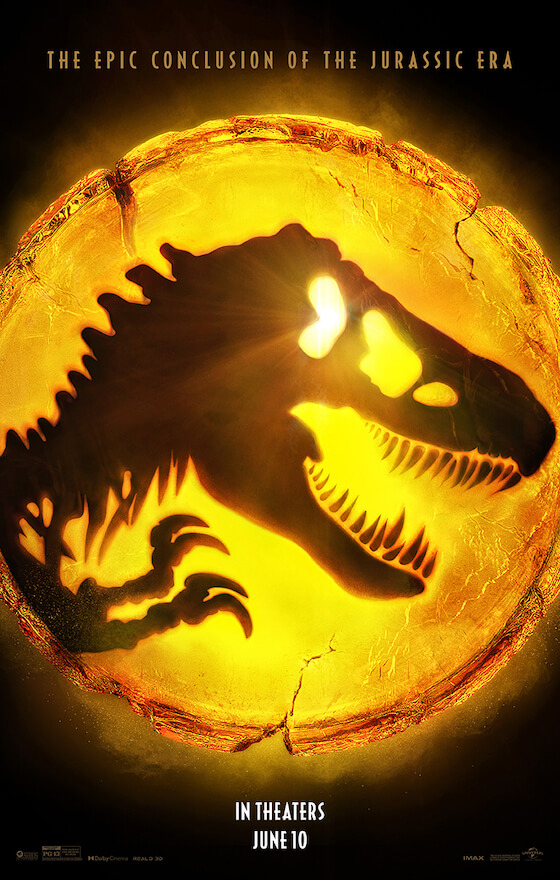Keeping the Cameras Rolling
General Counsel Christopher Miller (’00) helped lead Universal Filmed Entertainment Group through the pandemic and now looks to the future of the film industry.

Images courtesy of Universal Filmed Entertainment
Keeping the Cameras Rolling
General Counsel Christopher Miller (’00) helped lead Universal Filmed Entertainment Group through the pandemic and now looks to the future of the film industry.
In March 2020, Universal Pictures was filming scenes for the movie Jurassic World Dominion in London when production abruptly halted. The World Health Organization had declared COVID-19 a pandemic, and governments around the world were contemplating stay-at-home orders and border closings. As actors and production crews idled, the legal team at Universal Filmed Entertainment Group (UFEG) jumped into action—consulting with local governments on work and travel restrictions and poring over production and distribution contracts.

“In law school, you take Contracts and learn about force majeure, and then, more likely than not, you never think about it again for the rest of your career,” says UFEG General Counsel Christopher Miller. “It’s a provision in these contracts that nobody thinks about. You probably don’t even negotiate it.”
But if ever there was a force majeure event for a movie studio—an unforeseeable circumstance preventing it from fulfilling its contractual obligations—it’s a government order to cease nonessential contact, Miller (’00) says. You can’t film a crew of actors banding together to battle dinosaurs when everyone’s quarantined at home.
Miller was named general counsel of UFEG in late 2018, and the majority of his three-and-a-half-year tenure has been dominated by pandemic-related concerns. UFEG includes several film studios, all of which had to figure out how to continue the business of making and distributing movies despite a pandemic that threatened to keep film crews separated and audiences out of theaters—and without losing focus on the post-pandemic future.
Distribution, Disrupted
While Universal Pictures was grappling with production delays on Jurassic World Dominion, DreamWorks Animation, another UFEG studio, was making crucial distribution decisions. DreamWorks completed the $90 million animated feature Trolls World Tour before the pandemic and was set to release it in theaters worldwide in April 2020, with at-home streaming available months later. With so few people willing or even able to visit theaters that spring, DreamWorks decided to release the movie as a premium digital rental for at-home viewers while simultaneously making it available to any theaters that remained open.
“The movie theaters were very public about how they were displeased with that decision,” says Miller. “It disrupted the ecosystem, but it was absolutely the right business decision.”
The entire film industry is now following DreamWorks’ lead. The traditional months-long window between theatrical release and availability for in-home viewing is collapsing, as film studios radically renegotiate their relationships with theater owners.
“We’ve permanently disrupted the way that movies are going to be consumed,” says Miller. “It’s what the consumers wanted. This was a trend that, I think, was inevitable, and the pandemic just put it on steroids in terms of timing and sped things up dramatically for us.”
Moving Up in the Movie Industry
A Minnesota native, Miller studied guitar as an undergraduate at the University of Southern California but quickly realized he didn’t want a career in music. After completing law school, he returned to California and worked for three years in law firms with strong entertainment practices. In 2003, he joined the storied but struggling Hollywood studio MGM and subsequently was named associate general counsel.
“I ended up living through seven CEOs and two general counsels while I was there, which ultimately just created opportunity for me,” Miller says. “I started as a litigator. Next, I was a theatrical distribution lawyer. Then we were doing corporate technology deals. When you’re at a place that isn’t a giant conglomerate, but you’re competing with a conglomerate, you end up getting exposed to so much more because you don’t have as many people around you to do the work.”
We’ve permanently disrupted the way that movies are going to be consumed… This was a trend that, I think, was inevitable, and the pandemic just put it on steroids in terms of timing and sped things up dramatically for us.
Even when he was very busy, Miller volunteered to take on extra projects at MGM, he says, “because that’s how you learn and diversify your skillset and you become a better lawyer.”
In 2010 Miller moved to DreamWorks Animation to work as the studio’s head of litigation and technology law. While he was already well versed in business transactions and litigation, the technology side of his role was new.
“At DreamWorks Animation, they were literally hiring rocket scientists to make fire look more like fire. They had a patent portfolio. They were writing their own source code. They were using open-source code,” he says. “They were the real deal from a technology standpoint, and I had to come in and immediately acknowledge what I didn’t know and try to learn as quickly as possible.”
Seven years later, Comcast acquired DreamWorks and folded the studio into its Universal Filmed Entertainment Group, which is part of NBCUniversal. Within two years, Miller was promoted to general counsel of UFEG, the arm of NBCUniversal that acquires, produces, markets, and distributes feature-length entertainment. (Other segments of NBCUniversal focus on news, sports, television programming, internet-based businesses, and theme parks.)
UFEG releases 30 or more movies each year—ranging from blockbusters like the Jurassic World and Fast & Furious movies to Focus Features’ arthouse films to animated favorites such as Despicable Me and How to Train Your Dragon. As general counsel of UFEG, Miller oversees a team of more than 150 lawyers and staff, including a legal team in each division of UFEG’s business, and is responsible for coordinating with hundreds more that specialize in litigation, privacy, compliance, labor/employment, government affairs, and intellectual property. He is the senior legal advisor to UFEG’s management team and ensures the group is properly managing all its business risks.

Resuming the Work and Looking Ahead
For the past two years, Miller and his team have worked closely with entertainment industry unions and guilds to keep film productions running, despite the ongoing pandemic. Jurassic World Dominion resumed filming in July 2020, after Universal Pictures committed to spending millions of dollars on COVID safety protocols, including buying thousands of COVID tests and renting an entire hotel in England where the cast and crew quarantined for two weeks before the resumption of filming. The film is due in theaters in June, a year behind its original schedule.
UFEG’s legal team has also focused on matters crucial to the future of the film industry, including workforce diversity. UFEG recently worked with unions and guilds to launch a training program to bring more people from underrepresented groups into behind-the-scenes positions on movie sets—as hair and makeup staff, camera operators, sound and lighting specialists, etc.
UFEG also continues to examine the distribution options for its films. Miller says he absolutely sees a future for movie theaters, but they may no longer be a studio’s default distribution option. While some movies may continue to hit theaters before being available for streaming, others may be released to theaters and streaming services simultaneously, and still others may bypass theaters altogether.
“I think there’s going to be more experimentation in terms of trying to figure out the business model for us over the next few years,” Miller says.
Regardless of the model, Miller sees a future for himself in the industry.
“I really do like participating in the creative process,” he says. “I find it intellectually interesting, but I also find it fun.”
And the fun part isn’t just attending movie premieres, he says. It’s participating in the full arc of a film project. Being in the room when someone suggests obtaining the rights to a story, he says, and then ultimately watching that story unfold on a movie screen “is a pretty fantastic journey.”
